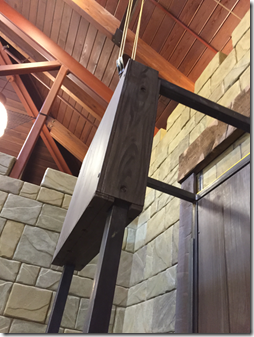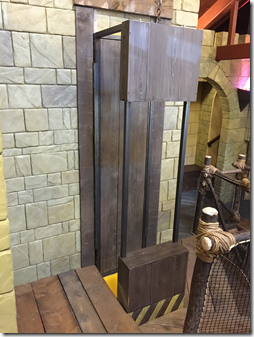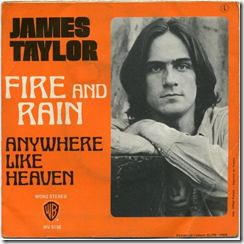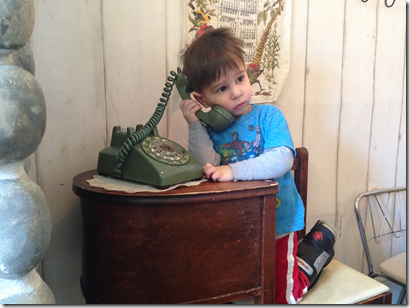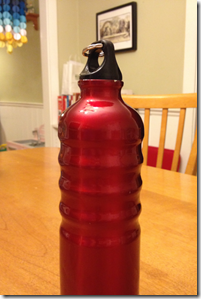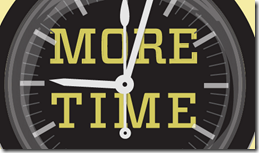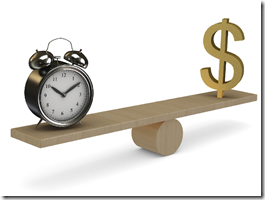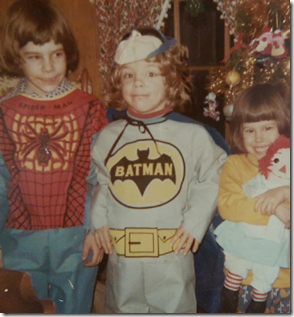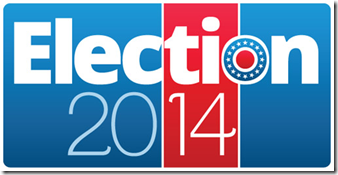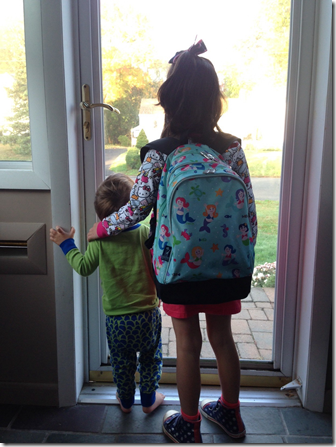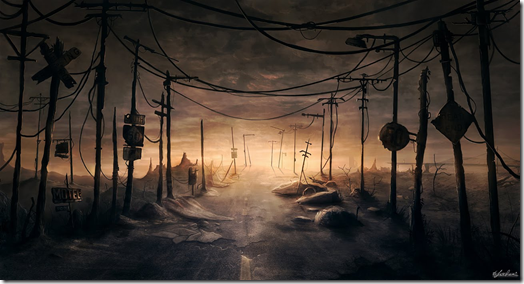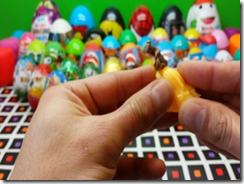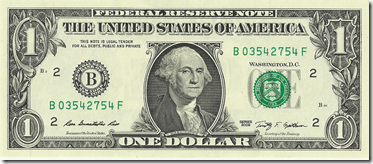A restroom puzzle: How exactly is this configuration of toilets supposed to work?
/Could someone please explain the restroom configuration to me?
I stepped into the restroom, wondering if I should lock the door. I planned on using one of the urinals, so should I have left the door unlocked in the event another man entered, wanting use of the other urinal?
That seemed to make sense, but what if the man entering requiring the use of the toilet? Presumably he would not drop trou while I was standing there, which means he would have to stand by and wait. This would quickly become awkward as he watched me go about my business, standing ideally in the corner. In order to break the tension, maybe he would attempt some small talk, at which point he and I would probably have preferred that he be waiting outside the room.
And what if three or more men entered the restroom? Even if all of them required use of the urinal, the room is small. Things would get tight rather quickly.
It took me a moment to decide, but in the end, I opted to lock the door, keeping the restroom to myself.
Just me, three inexplicable toilets, and a lot of questions about what kind of rationale went into the design of this ridiculous restroom.
Would you share your toothbrush with a loved one? Or anyone?
/There are two kinds of people in the world:
People who are willing to share their toothbrush and those who are not.
The people willing to share are generally better people. Perhaps not as wise or prudent, but better. More trusting and generous and relaxed.
I would share my toothbrush with my wife, my children, and almost anyone else I know.
It's also important to note that the Center for Disease Control and Prevention recommends that you never share your toothbrush under any circumstances. In some cases, sharing a toothbrush can lead to life threatening infections.
I guess Billy Joel was right. Only the good die young.
Ladies: Leave my choice of winter clothing alone. I’M FINE.
/Over the course of the last seven days, I have been scolded by three different people – all women – for wearing shorts. In each case, I was either heading to or from the gym, but I’ve also been known to wear shorts in cooler weather simply because they are comfortable and I don’t require the warmth of a pair of pants.
I was also repeatedly chided all winter long for wearing my winter coat of choice: a blue hoodie.
I own an actual winter coat. More than one, in fact. But with the exception of a few New England Patriots games, I wore a hoodie all winter long and was perfectly fine. Warm and toasty.
Except that wherever I went, friends and strangers – also only women – admonished me for not wearing something warmer. People at the grocery store and outside restaurants and in parking lots told me to put on something warmer. Stop being ridiculous. Act my age.
Many of them also warned me that I would catch a cold if I continued to dress this way, disabusing themselves of hundreds of years of germ theory and reverting back to a time before science when it was assumed that a cold was caused by the cold.
Honestly, I don’t understand this.
Who cares if I’m wearing a pair of gym shorts on a 38 degree day?
Why would anyone be concerned with my choice of outerwear on a winter afternoon?
How is what I wear in order to stay warm anyone’s business other than my own?
And why is this form of criticism exclusively female?
For the last year, I have attempted to avoid any negative comment about anyone’s physical appearance, regardless of their physical eccentricity. And I have become fairly adept – albeit a little smug – in doing so. In fact, I’ve reached a point where thoughts about a person’s physical appearance often fail to register as well.
When they do, I push them back, reminding myself of how petty and cruel and absolutely juvenile they are, even when said behind someone’s back.
I realize that scrubbing your mind and voice of all comments on physical appearance is a ridiculous goal, but can we at least agree these admonishments over seasonal appropriate clothing should be eliminated from our societal lexicon forever? If these women – and perhaps there are male critics out there, too, but I have yet to encounter one – want to go home and tell their loved ones about the man at the grocery store wearing shorts and a hoodie, fine.
They are heathen, unkempt trolls for doing so, but still. Who cares?
But why must they verbally reprimand me in public for not dressing to a standard that they feel is adequate?
I had a mother. She passed away in 2007. I miss her, but honestly, I’m fine. I don’t need any ladies – young or old – treating me like I ‘m a ten year-old boy in need of verbal reprimands about the warmth of the clothing that I’m wearing.
Even my mother didn’t do that.
Please leave me the hell alone. I’m fine. If I wasn’t, I’d put on a pair of pants and a warmer coat, jackass.
A replica guillotine in the middle of a children’s museum?
/The local children’s museum, Kid City, recently opened a new medieval room. It’s a fantastic exhibit that includes castle walls, towers, a crossbow range, a tavern, a brick factory, and what I can only assume is a bladeless guillotine:
I am not opposed to the replica guillotine – in fact I kind of love it – but I can’t imagine that there aren’t a hoard of namby-pamby parents and guardians who take one look at this thing and shield their child’s innocent eyes and flee.
How does Kid City get away with this?
By the way, I love Google’s definition of namby-pamby:
“lacking energy, strength, or courage; feeble in behavior or expression.”
It’s sort of perfect. Don’t you think?
5 questions about the third line of James Taylor “Fire and Rain,” which will likely plague me until the end of days.
/The first lines from James Taylor’s song Fire and Rain confuse me.
Just yesterday morning, they let me know you were gone.
Suzanne, the plans they made put an end to you.
I walked out this morning and I wrote down this song,
I just can't remember who to send it to.
Put aside the first two lines, which are confusing in their own right, and the fourth line, which is also slightly baffling. I’m interested in the third line, where Taylor says that he wrote the song ‘this morning.” It raises a number of interesting questions.
This may get a little complicated. See if you can follow:
1. Did Taylor actually write that line on the day that he wrote the song? Did he really walk out on the morning in question and write this song?
2. If he wrote it on the morning in question, did he then insert the line, which is the third in the song, into the song after writing the rest of the song? Or did he write the third line as the third line, indicating in the past tense that he had written a song this morning even though he was only three lines into the song at that point?
3. Is the line unauthentic? Did Taylor actually write this song at some other time rather than on the specific morning mentioned in the song? Is the mention of writing the song just part of the fantasy of the song, written only for the purposes of the narrative?
4. If the third line is inauthentic, why say it at all? Does this falsified timeline within the song really add anything to the song?
Here’s the most confusing of the questions:
5. If the line isn’t meant to be authentic, are we to then believe that James Taylor is singing these words, or is the songwriter referenced in the song someone other than James Taylor? Is Taylor writing and singing about a different singer-songwriter who has supposedly written the song, and if so, while performing the song, are we supposed to understand that Taylor is merely playing the role of that singer-songwriter, even though he also a singer-songwriter?
Did you follow?
More importantly, are you as disturbed about these questions as me?
This is not a telephone, so how does my son know that this was once a telephone?
/My wife sent me this photo of my son from a recent visit to a children’s museum.
Yes, my family gets to go to children’s museums during the week while I slave away in the mines.
When I saw the image, I couldn’t help but wonder how Charlie understood how to use this device. It’s so unlike any telephone that he has ever seen in his life. The rotary dial, the cord, the immobile base, and even the separate, oversized, oddly shaped handset are all foreign to him.
Yet there he is, holding it to his ear, pretending to make a phone call.
Then again, I’ve also seen my son pretend to make phone calls using bananas and shoes, so perhaps imagination has a lot to do with it.
Yet somehow bananas and shoes more closely resemble the phones that Charlie has seen than this thing. Think about it:
- Bananas and shoes are the same shape as our cordless phone.
- Bananas and shoes are portable, like every phone Charlie has ever seen.
- Bananas and shoes have no cords dangling from them.
- Bananas and shows have no finger wheels affixed to them.
- Bananas and shoes have no numbers on their surfaces, which our iPhones don’t have, either. To Charlie, most of the phones that he’s ever seen have clear, black surfaces. He’s probably never even seen an the number pad on any iPhone.
I have to assume one of two things:
- Somehow the ancient, rotary phone has insinuated itself into human genetic code.
- My son is a genius.
Wanted: Photographs of sofas and slippers and well appointed thermostats. Please?
/My Facebook feed has been full of wine over the past couple days.
Wine glasses set before roaring fires. Wine glasses being clinked in celebration. Wine glasses standing beside the spines of books and sleeping dogs and flickering candles.
It’s a funny thing. I spent last night drinking cold water from a steel water bottle. It was refreshing. Delightful, really. But I’d never think to post a photograph of it on social media.
Yet alcohol, and especially wine, seems to be the drink de jour. The universal symbol of relaxation. Celebration. There are moments when it seems as if half of the status updates in my Facebook feed include alcohol of some kind. Photos from bars and restaurants. References to wine and beer and spirits. Lamentations about the need for more alcohol. Boasts about the amount of alcohol already consumed.
I don’t drink. I belong to the tiny fraction of the population that doesn’t have a drinking problem but simply opts to not drink. I’ll have a glass of champagne when celebrating with friends or rare glass of wine at dinner, but otherwise, a soda or a water does me just fine. Makes me quite happy, in fact.
But water and soda don’t possess the inexplicable prestige that alcohol does. Water and soda – in some high school kind of way – aren’t cool. Posting a photograph of my bottle of water on Facebook would be ridiculous.
Settling in for a night of reading, writing, and maybe a little TV with my beautiful wife and some cold water. #perfection
Strange, Right?
But of all the things we could photograph to symbolize our relaxation, so many of us choose alcohol. I think it’s just as strange as my water bottle.
I sometimes wonder if all of this attention that alcohol receives isn’t the residue of a time when we couldn’t drink alcohol legally. When you’re 16 years-old and you start drinking, you feel mature. Sophisticated. Cool. Ahead of the game. Maybe those positive associations permanently attach themselves to alcohol in a way that causes people to view a glass of wine or bourbon as a powerful symbol of their adulthood. Their own prestige.
I didn’t start drinking until after graduating high school. Maybe I lack that residue.
I’m spit balling here, I’ll admit. I guess what I really want to say is this:
What the hell is with all the photos of wine and references to spirits on Facebook, people? How about a photograph of our couch instead? Or the book that you’re reading? Or your slippers? Or the quilt that you have wrapped around your body? Aren’t all of these things just as relaxing as that glass of wine, strategically framed by the light of your fireplace?
How about an occasional sofa? Or a pillow? Or a thermostat set to a toasty 72 degrees?
If nothing else, for the sake of a little diversity.
How did television meteorologists become household names, and why can’t I name a single one of these guys?
/Everyone in my life seems to know the names of the television meteorologists. They say things like, “Brad Somebody is hosting this charity event next weekend” or “Bruce Gobbledygook says it’s going to rain tomorrow.”
Even my student’s know these names.
I can’t help but wonder:
These people can’t actually be watching the local news. Right?
They can’t be sitting through reports on car accidents and house fires and gas station robberies in order to hear a weather forecast that they can get on their phone or computer at any moment. Can they?
And if not, how does everyone seem to know Brad Somebody and Bruce Gobbledygook’s names?
Who ever said that domestic violence and sexual assault are hard subjects to talk about? What’s the deal, NFL?
/I applaud the NFL for their recent “No More” campaign, targeting domestic violence and sexual assault. I hope they continue to raise awareness and assist victims in every possible way.
But their recent series of television ads baffle me. The ads, which feature prominent football players staring in silence at the camera, end with the message:
Domestic violence and sexual assault are hard subjects for everyone to talk about. Help us start the conversation.
I don’t think that domestic violence and sexual assault are hard to talk about at all.
Does anyone?
Perhaps it would be difficult to talk about these subjects with my children or my fifth graders. Maybe it would be difficult to discuss if I were the perpetrator of these crimes. But what is so hard about discussing these topics with law-abiding adults?
I honestly don’t get it. I can’t think of a single person in my life with whom I couldn't talk about sexual assault and domestic violence.
What am I missing?
How much would you pay for one more hour in your day. Hint: There is a correct answer, and most Americans got it wrong.
/A new survey says that more than half (58%) of Americans are willing to pay cash in exchange for one more hour in their day, and that the average amount that these people are willing to pay for that extra hour is $2,725.
From the TIME piece:
The fact that people are willing to shell out that kind of cash is, well, sad, but also indicative of a larger problem that is unfortunately hard to buy your way out of: An out-of-whack work-life balance.
Am I the only sane person left in this world?
Only 58% of people would pay money to add an hour to their day? What the hell are the other 42% thinking? Do they have any idea how valuable an extra hour a day could be?
Sorry. Stupid question. Clearly they do not.
Time is the most precious commodity on the planet. More valuable than oil or diamonds or fame or even cold, hard cash. Time is a tragically finite resource for which there will never be any replacement.
Time is the great equalizer. We all have 24 hours in a day. No more. No less. If you can get an extra hour on everyone else, you would be an idiot not to pay for it.
If given the opportunity to purchase anything in this world, you should always purchase time first, and then time again and again and again.
Yet 42% of Americans would apparently not spend even a single dollar for an extra hour a day.
Clearly traumatic brain injury is a more serious problem than I ever imagined.
Next, let’s look at the amount that the average American would be willing to spend for an extra hour a day: $2725.
Have these people also been hit in the head by large objects?
An extra hour a day for the rest of you life isn’t worth the price of a motorcycle? Season tickets to your favorite baseball team? One-fifth of the average kitchen remodel in America?
I would pay as much as I possibly could for an extra hour a day. I would take out a second mortgage on my home for an extra hour in my day. I would forfeit a year’s salary for an extra hour every day. I would have another child with my wife just so I could trade my third-born child for an extra hour in my day.
An extra hour a day amounts to an extra 15 days a year. That’s an additional year of life every 25 years.
An additional year of life is worth less than $2,700?
People are insane. Stupid and insane.
Lastly, let’s look at the rant of TIME writer Melissa Locker again:
The fact that people are willing to shell out that kind of cash is, well, sad, but also indicative of a larger problem that is unfortunately hard to buy your way out of: An out-of-whack work-life balance.
Sad? Has Locker been struck in the head by a ballpein hammer, too? Does she not understand the value of an extra hour a day for the rest of your life?
Sorry. Stupid question again. Clearly she does not.
The desire for an extra hour in the day is not sad. It’s not indicative of an out-of-whack work-life balance. Desiring an extra hour every day (and being willing to pay for it) is common sense. It’s logic. It’s an understanding of time on an economic level. A clear-eyed view on how short and precious life is and how valuable one hour a day, seven hours a week, and 365 additional hours every year would be.
Sad to be willing to pay for an extra hour every day? I don’t think so.
What’s truly sad it how people don’t realize how fragile and tenuous our lives really are. How fleeting our days on this planet will prove to be. How much they will they will have wished for those extra hours when facing the specter of death.
An extra hour every day would be the greatest opportunity imaginable. And the greatest bargain of all time at $2,7o0.
Perhaps I have more in common with the Matthew Dicks of Des Moines, Iowa than just our names and our mug shots
/Back in May of 2011, I wrote a post lamenting the fact that a person with the same name as me has been arrested in Des Moines:
Great. Someone who shares my name has been arrested and booked at the Polk Country Jail in Des Moines, Iowa for failure to pay child support.You’d think my name is difficult enough without guys like this further besmirching it.
Recently, my namesake's girlfriend contacted me, asking me to remove the post. I initially balked at the request. The man’s mug shot is available online on desmoinesmugshots.com. Removing it from my blog wouldn’t remove it from the Internet entirely, and it wasn’t like that post, written more than three years ago, was garnering any traffic.
Then it occurred to me:
I have a mug shot as well. I’ve never seen it, and because it was taken in 1992, it’s unlikely to ever appear on the Internet. But in some police database, a photograph of me exists, alongside the charges of grand larceny and embezzlement.
I was not guilty of those crimes, and I was eventually exonerated at the end of a lengthy and expensive trial, but had I been arrested two decades later, I might be in this man’s same position. My mug shot might be posted on the Internet.
Elysha might be as upset as this man’s girlfriend clearly is.
Truthfully, I don’t even know if this man was guilty of a crime. Like me, perhaps he was falsely accused. There’s no more ardent supporter of the concept of “innocent until proven guilty” than me.
Wasn’t placing his mug shot on my blog antithetical to that position?
Had it been my image posted on the Internet, I might want my mug shot to appear in as few places as possible, too.
And having been the victim of a widespread, illegal smear campaign later in my life, I understand the pain associated with someone attempting to destroy your reputation.
So I deleted the post. Honestly, I felt bad that I ever posted it in the first place. A Google Alert on my name had probably brought it to my attention, and finding it both coincidental and amusing, I decided to post it to my blog.
But had I thought about how much more that this man and I might have in common beyond just our name, I probably would’ve never posted it to begin with.
Halloween has meant many different things to me depending upon the year. Have your Halloweens followed a similar trajectory?
/Halloween is one of the few holidays that has changed completely depending on how old I am.
As a child, I donned a Halloween costume and went trick-or-treating, hoping to accumulate as much candy as possible in the allotted time. I learned to despise homeowners who gave us trail mix or Rice Crispie squares and adore those who were generous enough to offer full sized candy bars to children.
As a teenager, I became more enamored with the tricks and not the treats. Egging the homes and toilet papering the front lawns of deserving teachers and loathsome trail mix dispensers became the order of the day.
As much as I loved trick-or-treating as a child, this was better. More exciting. More dangerous. My favorite of all my Halloween experiences.
My car was once toilet papered by friends so completely that I walked right past it, wondering what poor sucker would be cleaning all that off his car before driving to work.
As a late teenager and twenty-something, Halloween shifted again. It became an excuse to throw a party. The importance of costumes returned, but instead of using them for trick-or-treating, they were an excuse to gather, flirt, and drink excessively. Bobbling for apples became quasi wet tee shirt contests. Princesses became sexy nurses. Plastic, super hero masks became costumes designed to demonstrate your cleverness and creativity to the opposite sex.
As I got older, the costume party scene began to evaporate. Sexy nurses got married. Excessive drinking lost its luster. Until I had children of my own, Halloween became an awkward time when a handful of colleagues dressed up in Halloween costumes during the work day, and I spent my Halloweens at home, watching horror movies, handing out candy, and feeling lame.
Eventually, I became a teacher, and this filled my Halloween days with classroom parties, costume parades, and the childhood excitement of Halloween that I had long since forgotten.
In an attempt to embrace the excitement, I created short films for school assemblies that terrified children and upset kindergarten teachers. I devised stories to tell my students that (in the words of Mo Willems) scared the tuna salad out of them.
Then my own children came along, so once again I find myself walking the streets of my neighborhood, trick-or-treating. Nowadays, there is responsibility associated with Halloween. I have a peanut-allergic daughter, so I must remain vigilant when inspecting candy. I must be watchful for cars and creeps. I am required to shoot photographs in low light and carry tired children in my arms.
There is a sense of childhood joy in Halloween again, but there is also responsibility and obligation. Wariness and even a tiny bit of worry.
I love it, but it’s not the same as when I was a child. Not even close.
I probably have about a dozen years of this version of Halloween before my children are asking to trick-or-treat on their own. Perhaps the tricks will become more important than the treats for them, too.
I hope so.
I’m not sure what happens to Halloween after that. I would imagine that for many older adults, Halloween becomes an evening of answering doorbells and handing out candy. Little more.
I’ll have to find something better. Something joyous or thrilling or both. I see the excitement in my students’ eyes and my children’s eyes and want to hold onto that. Never let it go.
Maybe I’ll volunteer at a haunted house. Or attend a Rocky Horror Picture Show performance. Or take grandchildren trick-or-treating.
Or maybe I’ll just egg just a few more houses.
Who is watching these political ads?
/The Center for Responsive Politics estimates that nearly $4 billion will be spent on television advertising for the 2014 midterm elections, up from $3.6 billion in 2010.
My question:
Who is watching these ads?
We’re about two weeks from Election Day, and I have yet to see a single political ad on television. I suspect the same goes for my wife. Granted, we don’t watch much television, but even if you’re among the zombie class of average Americans who watch 6-8 hours of television a day, who isn’t time-shifting their television viewing in order to avoid commercials? More than 70% of American households own a DVR.
People don’t actually watch live television anymore. Do they?
Even if Elysha and I plan to watch a television show on the night that it actually airs, we wait 20 minutes before turning it on so we can bypass the commercials. And if it’s a show on HBO or Netflix or OnDemand, there are no commercials.
Where are people encountering these commercials?
While I’m sure that the viewing habits of every American does not match my own, I can’t imagine that enough people watch television live to warrant spending $4 billion dollars on television ads.
And if I’m wrong, what the hell is wrong with you people? Why are you wasting time watching commercial television?
So I’m serious. Is anyone actually seeing these political commercials?
Purposeful procrastination: Are slightly lower grades really all that bad?
/A new study suggests that students who turn in homework at the last minute get worse grades.
Of the 777 students involved, 86.1 percent waited until the last 24 hours to turn in work, earning an average score of 64.04, compared to early submitters’ average of 64.32 — roughly equivalent to a ‘B’ grade.
But the average score for the most part continued to drop by the hour, and those who turned in the assignment at the last minute had the lowest average grade of around 59, or around a C+.
It’s a bit of a no brainer and something that a reasonable person might have accurately assumed absent this research, but I think a more important question remains unanswered:
Are the procrastinators learning less?
I am a strong advocate of purposeful procrastination in all non-critical tasks. If I report is due to my boss on Friday, I will wait until the last possible moment to begin working on it, filling my time in between with more meaningful and enjoyable tasks. Being constantly concerned with the prospect of death, the last thing I want to do is spend my final day on Earth completing something mundane or ultimately unnecessary that I could’ve been done three days later.
Many think that factoring in the possibility of death into my to-do list is fairly insane, but those critics will die someday, and it will probably be on a crisp, September day spent sorting receipts for next year’s taxes.
As a purposeful procrastinator, I’m left wondering if the procrastinators in this study who are turning in work at the last moment and achieving slightly lower grades are actually learning less, or are their grades merely a reflection of a rushed effort that contains all of the learning required but with less polish?
And if so, do these lower grades actually matter? If the procrastinators and the non-procrastinators are equal in their learning, do the slightly higher grades of the non-procrastinators yield a greater number of job offers? Higher starting salaries? More rapid advancement?
In most cases, I don’t think so.
I’d also love to see the differences in happiness between procrastinators and non-procrastinators. In my admittedly biased and anecdotal experience, the procrastinators of the world seem to be a more relaxed and less anxious group of people. They seem to handle stress and uncertainty better. They appear to be less concerned with the opinions of others. They are not the ardent people-pleasers that aggressive completionists tend to be.
Don’t get me wrong. All procrastination is not good. Allowing your laundry to reach the point that you must devote an entire day to it is not a good idea. Waiting until the last minute to write your novel will probably result in a poor effort. Forgoing your oil change for another 5,000 miles is not a wise decision.
But a fairly innocuous college assignment?
Maybe the slightly lower grade isn’t such a bad thing if you fill the time that you spend procrastinating with something that is meaningful or joyful or more valuable.
And perhaps the process of completing the assignment at the last minute has its benefits as well. By purposefully procrastinating, maybe a person learns to manage stress better. Focus more effectively. Handle uncertainty with greater deftness.
This is the kind of research that I would like to see.
When you choose the name Moxie Marlinspike, you have to expect people to ask about the name. Just answer the question.
/I was listening to Moxie Marlinspike, an Internet security researcher, on the most recent episode of Planet Money.
Here is the exchange between Mr. Marlinspike and reporter Steve Henn:
Henn: Is that your real name?
Moxie Marlinspike: It is.
Henn: Was it on your birth certificate?
Moxie Marlinspike: No, it was not on my birth certificate, but it’s what almost everyone I have known has called me for most of my life.
Henn: What’s on your credit cards?
Moxie Marlinspike: Ah… which credit card?
Henn: You have a credit card with Moxie Marlinspike?
Moxie Marlinspike: Well, okay, I’m curious why you want to know?
Henn moves on (or edits out the rest of the exchange), but I’d like to answer Moxie’s question, because I want to know.
You see, Moxie, since you are an Internet security and privacy expert, I’m wondering if your apparent pseudonym is used to thwart the hackers who you spend so much of your life attempting to thwart.
It seems like pseudonyms might be relevant given your line of work.
If so, that’s interesting. I’m wondering if it’s effective.
If that’s not the reason (and I suspect that it’s not since your Wikipedia page lists two other names), I’d like to know why you changed your name to Moxie Marlinspike, because it's a fascinating choice of a name and may indicate something interesting about you.
It says even more when the man who chooses Moxie Marlinspike avoids answering questions about the origins of the name.
Add to this the fact that you possess a master Mariner’s license and a love for the sea (facts I found on your own website), and the last name Marlinspike seems to take on even greater meaning.
In short, your obvious dodging of the name questions (not to mention your initial attempt to obfuscate the truth by indicating that it was your real name) leads me to believe that the story behind your name amounts to little more than a man who wanted a name that was cooler than the one his parents assigned but is uncomfortable admitting to this fact.
I could be wrong. This is an enormous and perhaps erroneous assumption, but you sounded so defensive. So annoyed. There may be a damn good reason for the name. Maybe there’s an amusing (or less-than-amusing) story behind the name. If so, may I suggest you simply answer the question of whether or not your name is real with something like:
“It’s not my legal name, but it’s the name that I use, therefore it’s real. It’s a long and uninteresting story about how the name came to be.”
But the fact that you wouldn’t answer the reporter’s questions (and sounded fairly defensive while refusing), and the fact that the questions seemed fairly relevant considering the unusual nature of your made-up name and the fact that he was reporting on your company, which specializing in protecting your clients’ anonymity, leaves me assuming the worst. Unjustifiably, so perhaps.
And perhaps part of this assumption has to do with my own life history.
When I was nineteen, I told girls who I met while on vacation that my name was Gunner Nightwind, mostly because I was an immature douchebag.
I’m not saying that this is the case with you, but you haven’t given me much else to go on.
Open a toy. Record. Make a fortune.
/My wife made me aware of the inexplicable existence of YouTube videos that feature the removal of toys from their packaging.
That’s it. Someone purchases a Transformer or a Barbie Doll or a SpongeBob Squarepants action figure and opens the toy on camera.
And millions of people watch.
I can’t imagine who the audience is for these videos. Are little kids flocking to YouTube to watch their favorite toy emerge from it’s plastic cocoon? Is there a Brony-like brand of adult who is fascinated by this? Is this some kind of fetish that I can’t understand?
I don’t know.
I didn’t believe Elysha when she told me that these videos existed, so I started watching this one, which had ten million views at the time, waiting for something to happen.
Something… anything other than toys emerging from plastic.
Nope. Toys removed from packaging. That’s it.
The world is a strange, strange place.
What is the best way to invest one dollar?
/Melissa Batchelor Warnke of The Morning News asks: Say you had a buck in your hand: What would be the best way to invest it?
The piece features answers by two dozen people—a JP Morgan associate, a sex worker, a pastor, a living statue, a marine, and many more.
There are some great answers. My favorites come from the professional escort and the founder of DreamNow.
There are some stupid answers, too.
I’ve been struggling with three possible answers to this question, but after much internal debate, I have finally settled on one.
My runners-up include:
- Take my children to a penny candy shop. Allow them to purchase as much candy as possible. Walk to a park and devour the candy while we play.
- Find a company where I would love to work. Ideally a startup of some kind in a field that intrigues me. Call the CEO, the human resources director, or whoever else is responsible for hiring. Offer to buy them a cup of coffee in exchange for 30 minutes of their time. Attempt to win them over and land a job.
But my winning answer is this:
Purchase a notebook. Begin writing my next novel.
My wife’s answer was also excellent.
Download a song that is guaranteed to make me happy regardless of the circumstance or the number of times played.
Apparently there are two such songs:
Van Halen’s Jump and Hall & Oates You Make My Dreams Come True.




